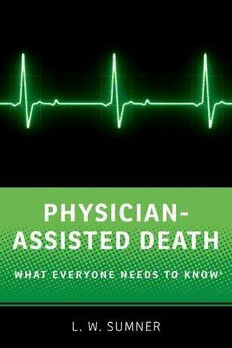
Physician-assisted death : what everyone needs to know PDF
Preview Physician-assisted death : what everyone needs to know
i PHYSICIAN- ASSISTED DEATH WHAT EVERYONE NEEDS TO KNOW® ii iii PHYSICIAN- ASSISTED DEATH WHAT EVERYONE NEEDS TO KNOW® L. W. SUMNER 1 iv 3 Oxford University Press is a department of the University of Oxford. It furthers the University’s objective of excellence in research, scholarship, and education by publishing worldwide. Oxford is a registered trademark of Oxford University Press in the UK and certain other countries. “What Everyone Needs to Know” is a registered trademark of Oxford University Press. Published in the United States of America by Oxford University Press 198 Madison Avenue, New York, NY 10016, United States of America. © Oxford University Press 2017 All rights reserved. No part of this publication may be reproduced, stored in a retrieval system, or transmitted, in any form or by any means, without the prior permission in writing of Oxford University Press, or as expressly permitted by law, by license, or under terms agreed with the appropriate reproduction rights organization. Inquiries concerning reproduction outside the scope of the above should be sent to the Rights Department, Oxford University Press, at the address above. You must not circulate this work in any other form and you must impose this same condition on any acquirer. CIP data is on file at the Library of Congress ISBN 978– 0– 19– 049017– 1 (pbk); ISBN 978– 0– 19– 049018– 8 (hbk) 1 3 5 7 9 8 6 4 2 Paperback printed by LSC Communications, United States of America Hardback printed by Bridgeport National Bindery, Inc., United States of America v For David vi vii CONTENTS PREFACE xi 1 How should we think about death and dying? 1 How do we tell when death has occurred? 1 What do we mean by death? 4 Why is it (usually) a bad thing to die? 9 How might death sometimes be a good thing? 11 How and where do we typically die? 13 2 What is end- of- life care? 15 What is the end of life? 15 What end- of- life treatment options are currently available to patients? 16 Do patients have the right to refuse treatment? 19 Do patients have the right to refuse life- sustaining treatment? 24 What is pain management? 30 What is terminal sedation? 32 What is physician- assisted death? 33 viii viii Contents 3 What is the ethical case in favor of physician- assisted death? 38 What is the argument from well-b eing? 38 What is the argument from autonomy? 41 When is PAD justified? 42 Is there an ethical difference between the two forms of PAD? 44 4 What is the ethical case against? 46 What is the right to life? 46 What is the sanctity of life? 48 What is the doctrine of double effect? 54 What is the doctrine of doing and allowing? 57 Is there an ethical difference between PAD and other end-o f- life treatment options? 59 What role can be played in this issue by religious arguments? 60 5 What is the history of legal physician- assisted death? 62 Is it legal for patients to refuse life-s ustaining treatment? 62 Is it legal to administer pain medication that may hasten death? 66 Is terminal sedation legal? 67 Where did any form of physician- assisted death first become legal? 67 Where has PAE become legal? 71 What has been happening in the United States? 85 6 What are the options for a legal regime? 91 Must the illness be terminal? 91 What kinds of suffering should be recognized? 94 What kinds of illnesses should be included? 97 ix Contents ix What about people who are just “tired of life”? 100 How do we determine decisional capacity? 102 Adults only? 103 PAS or PAE? 104 What procedures should be required? 106 What system of review and oversight would be appropriate? 109 What should be done about conscientious objection? 110 7 What is the case in favor of legalization? 112 What is the relationship between ethics and law? 112 What is the argument from compassion? 114 What is the argument from respect? 117 What is the argument from freedom of conscience? 118 What is the argument from parity? 121 What is the argument from democracy? 123 8 What is the case against? 127 What is the slippery slope argument? 127 What is the abuse argument? 133 Is helping patients to die contrary to a doctor’s professional duty? 144 Would helping patients to die undermine the physician–p atient relationship? 147 Are doctors willing to assist the deaths of their patients? 148 Is helping patients to die consistent with the goals of palliative care? 149 Would legalizing PAD erode the delivery of other forms of palliative care? 152 Shouldn’t we wait to legalize PAD until we can guarantee every dying patient high- quality palliative care? 153 Why do patients need doctors to help them die? Can’t they just do it themselves? 154 Why do patients need PAD when they can die by refusing food and water? 155
